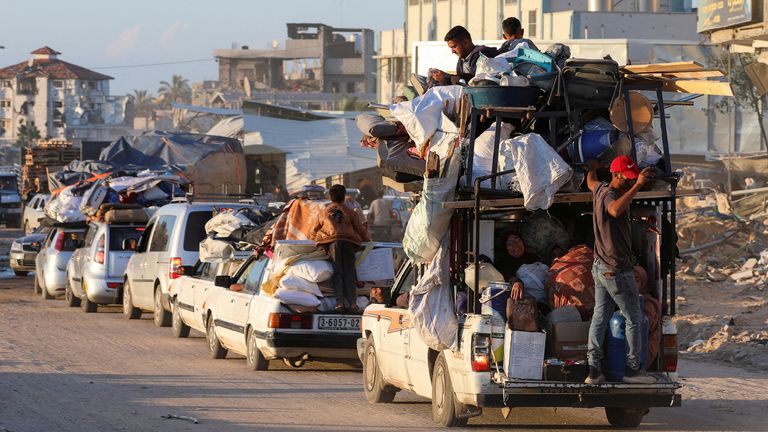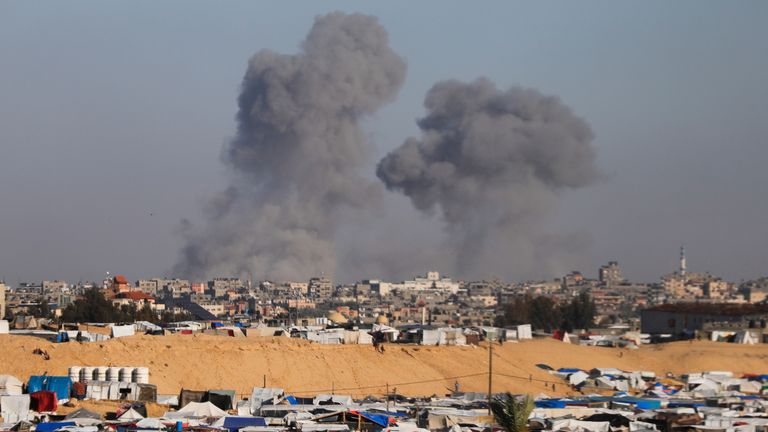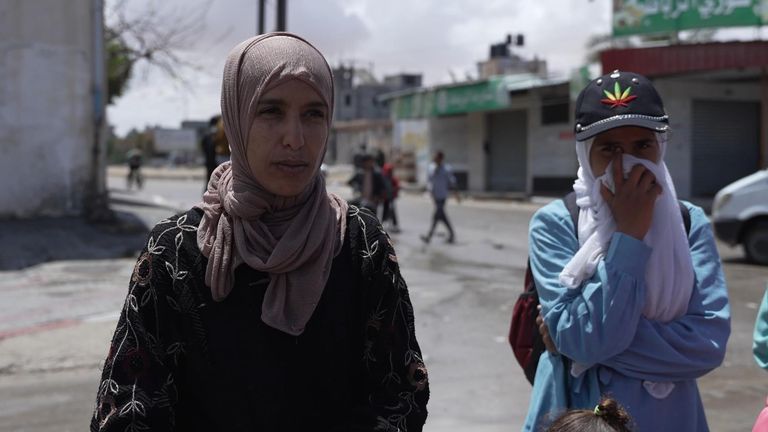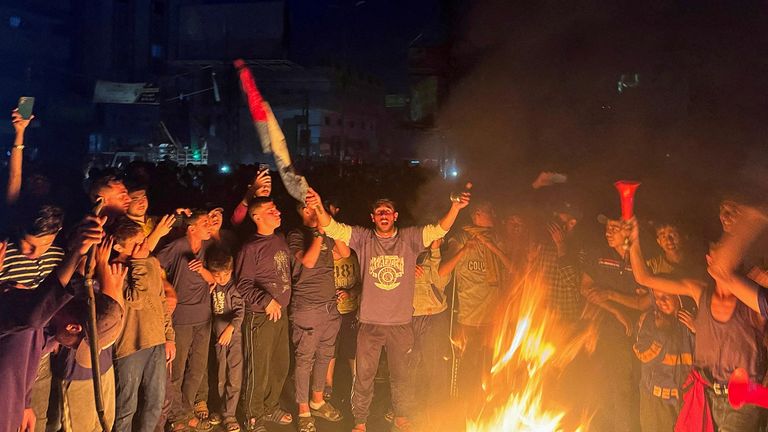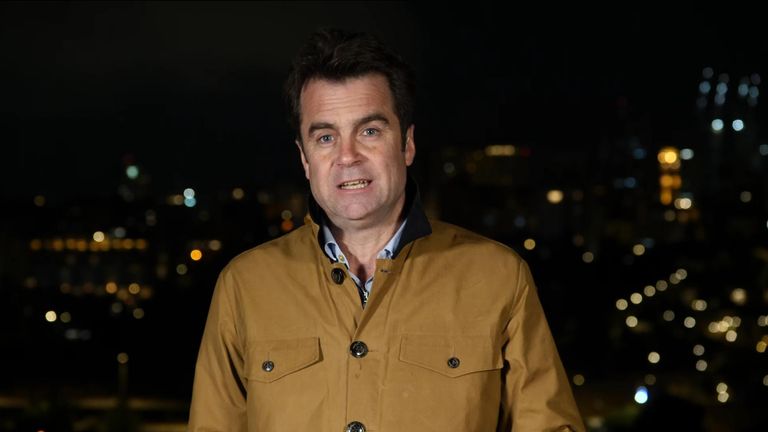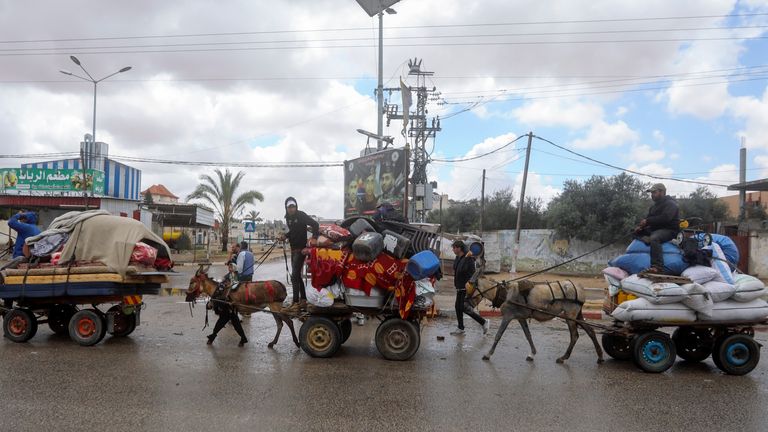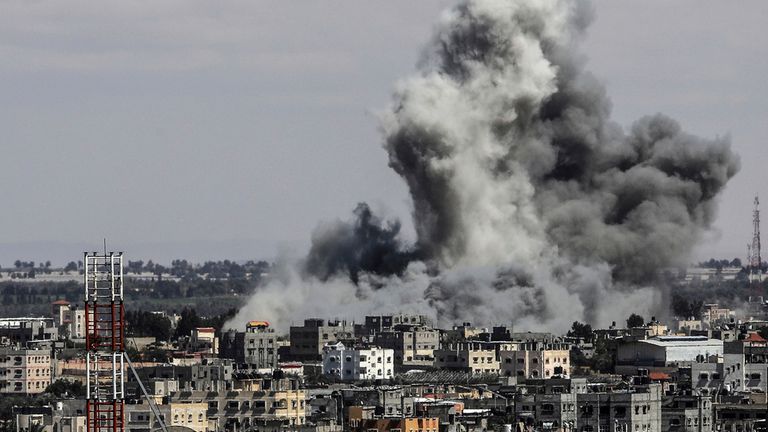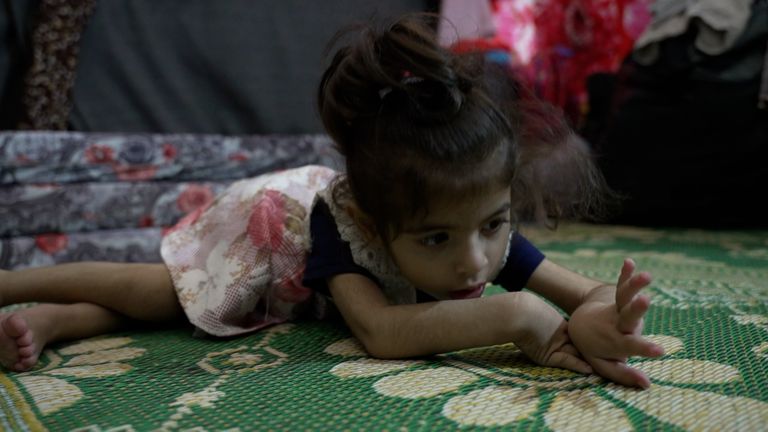Prospect of ceasefire deal between Israel and Hamas soon evaporated
When Joe Biden and Benjamin Netanyahu spoke late on Monday morning, hope for a deal seemed slim. Instead the focus was on what Mr Netanyahu planned to do with the troops he had ordered to amass in southern Israel just over the Israeli border fence from the Gazan city of Rafah.
Tuesday 7 May 2024 09:54, UK
It's been a whiplash-inducing 36 hours in Washington. Breakthrough or broke in Gaza?
The prospect of a ceasefire deal between Israel and Hamas, which had seemed possible during the weekend, ebbed away as Sunday turned to Monday. Then a moment, but one which soon evaporated.
So what's going on?
When President Joe Biden and Prime Minister Benjamin Netanyahu spoke by phone late on Monday morning, hope for a deal, being hashed out thousands of miles away in the Qatari capital, Doha, seemed slim.
Instead the focus was on what Mr Netanyahu planned to do with the troops he had ordered to amass in southern Israel just over the Israeli border fence from the Gazan city of Rafah.
Middle East latest: Follow live updates
As Mr Netanyahu and Mr Biden spoke, leaflets were fluttering down over Rafah, telling the more than a million people there to leave, to head north to Israeli-self-declared safe zones.
President Biden has repeatedly told the Israeli leadership America would not support a ground invasion of Rafah without a comprehensive and workable plan for the civilians - a plan that has not been forthcoming.
But over the past six months, we've all learnt American influence over its ally Israel has its limits.
Even US military officials have questioned the logic of a massive ground invasion of such a heavily populated area.
They understand the basic military objectives of rooting out the remaining Hamas battalions hiding in Rafah. Yes, those fighters are hiding behind civilians, but shouldn't that give pause for thought rather than ploughing on regardless?
Analysis: Peace in Gaza looks as distant as ever
Military operation doomed to fail?
The consequences of Israel's policy of flattening the cities north of Rafah are yet to be calculated.
Beyond the elusive concept of "total victory", Mr Netanyahu has never explained what his political endgame is or who the political partner in Gaza would be.
By the measure of most students of warfare and history, any military operation which lacks a clear political endgame is doomed to fail and will make a lasting settlement so much harder.
The phone call between Mr Biden and Mr Netanyahu lasted about half an hour and we're told it was "constructive".
The president "made clear" his views on the Rafah operation "that could potentially put more than a million innocent people at greater risk", his spokesperson said.
But the vibes from Israel were that the Rafah operation was looking more likely than not.
Hamas agrees to ceasefire deal
Then, at lunchtime in Washington, news suddenly of a potential breakthrough.
Hamas had issued a statement agreeing to the ceasefire deal.
A big moment it seemed. But what, precisely, were the terms of the deal they had agreed to? Which deal was it? The one Secretary of State Antony Blinken had trumpeted in yet another tour of the region last week? He'd called it "generous".
It wasn't clear, and as I write, it's still not entirely clear.
But in Rafah - they'd got wind of it. The scenes of jubilation were honestly sad to watch. They are so desperate for peace but they're so likely to be let down.
White House spokesperson unaware of latest bombings
A little later, no word from President Biden, but his spokesperson, John Kirby, was busy treading water. "We're currently reviewing the response," was the White House line.
Mr Kirby was then asked if he was aware bombs were being dropped on Rafah as he spoke. Was that not a clear indication that Mr Netanyahu was rejecting whatever Hamas had agreed to?
He was not aware of the latest bombings, he said.
Then, in an optically terrible moment, as the White House spokesman was saying (again) that President Biden was uneasy, at best, about something Israel was planning, Israel went right ahead and did it anyway.
An IDF statement was published which said: "The IDF is currently conducting targeted strikes against Hamas terror targets in eastern Rafah in the southern Gaza Strip. Details to follow."
The statement confirmed what our local teams on the ground were seeing and hearing with their eyes and ears.
Israel to send team to Egypt for ceasefire talks
My social media feeds are again full of the sort of images which we could never publish on taste grounds but which we have seen so many times during the course of this war.
Then a statement from Mr Netanyahu's office - the war cabinet had "unanimously decided Israel will continue its operation in Rafah, in order to apply military pressure on Hamas so as to advance the release of our hostages and achieve the other objectives of the war".
It added that a team would be sent to Egypt to "maximise the possibility of reaching an agreement on terms acceptable to Israel".
Jordan could be key to ceasefire
Rafah is part of Mr Netanyahu's negotiating strategy of course.
President Biden happened to be having lunch with King Abdullah of Jordan at the White House as news of the Hamas agreement came through.
In a conflict where we look hard for honest brokers to decipher what's actually going on, perhaps Jordan is close?
It's a key Arab nation, made up of so many exiled Palestinians, but a diplomatic partner to Israel and a key ally of America.
Be the first to get Breaking News
Install the Sky News app for free


Netanyahu 'jeopardising the deal by bombing Rafah'
After the lunch there was no comment from Jordan's Foreign Minister Ayman Safadi when I asked him if a deal was really possible.
Then, a tweet from him: "Tremendous effort has been made to produce an exchange deal that'll release hostages and realise a ceasefire. Hamas has put out an offer. If Netanyahu genuinely wants a deal, he will negotiate the offer in earnest. Instead, he is jeopardising the deal by bombing Rafah."
The opposing view is that Hamas has laid a trap, subtly shifting the terms of the deal allowing the world to think it's Israel who has rejected it.
There is one indisputable trap: Gaza. A miserable cycle of human suffering in a locked-off strip of land.

